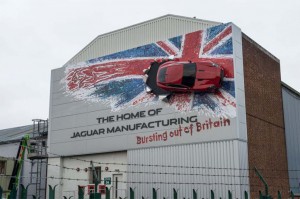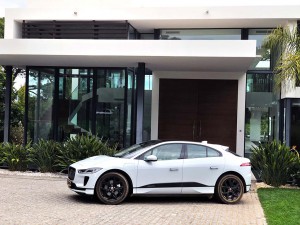
Ralf Speth, CEO of Jaguar-Land Rover, celebrates a win for the Velar as World Car Design of the Year.
Jaguar Land Rover plans to reduce the work schedules of some 2,000 production workers to three-day weeks at its Castle Bromwich plant in the West Midlands of England where the company builds several Jaguar vehicles.
The cutback comes as JLR faces pressure from uncertainty around Brexit. Additionally, a downturn in the sales of diesel-powered vehicles and the increasing popularity of sport-utility and crossover vehicles have hurt Jaguar’s sales.
Tata Motors-owned Jaguar Land Rover confirmed it had scheduled the cut in its production schedule at the Castle Bromwich plant in England where JLR builds Jaguar XF, XJ and XE sedans and the F-Type sports car due to the “continuing headwinds” impacting the British car industry.
The change in schedule, described as “standard business practice” by the Tata Group, which will shift workers from a five-day week schedule to a three-day week until Christmas this year. “In light of the continuing headwinds impacting the car industry, we are making some temporary adjustments to our production schedules at Castle Bromwich,” a spokesman told the British press.
(Jaguar offering new, but old electric vehicles. Click Here for the story.)
“We are, however, continuing to overproportionally invest in new products and technologies, and are committed to our UK plants in which we have invested more than £4bn since 2010 to future-proof manufacturing technologies to deliver new models.”
JLR Chief Executive Ralf Speth has previously cited uncertainty about Brexit and confusion related to a government policy on diesel engines as factors limiting JLR’s prospects, after it cut 1,000 jobs last spring.
Brexit, Great Britain’s plan to withdraw from the European Union, remains a major issue for carmakers operating in the British Isles because the production costs will increase as the value of the British pound sinks. In addition, the carmakers making vehicles in Great Britain could lose tariff-free access to the EU, which is one of world’s three largest automotive markets.
(Click Here for more about the new Jaguar I-Pace.)
JLR executives warned last week that thousands of jobs in the automotive sector would be at risk if the UK leaves the EU without agreeing on an exit deal with Brussels.
David Bailey, an automotive expert at Aston University, told The Guardian newspaper that Brexit and diesel problems were a “double whammy” for JLR. “Brexit uncertainty dragged down the market overall,” he said. “On top of that, the shift away from diesel hurts JLR especially because over 90% of their sales last year were diesel.”
He also warned that Castle Bromwich was a particularly vulnerable plant, which narrowly avoided closure in the aftermath of the 2008 financial crisis. “If there is a hard Brexit, I do fear for its future,” he said.
(To see more about Jaguar Land Rover’s plans for off-road autonomous vehicles, Click Here.)
The automotive industry, which employs 186,000 people in the UK, has been among the most vocal sectors in British industry about the pitfalls of a no-deal Brexit where Great Britain leaves the EU with no guarantee of access to the European market.


